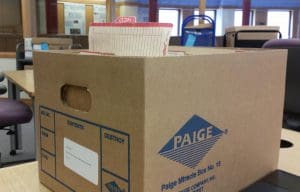 The International Institute of Minnesota, founded in 1919, has a rich history. The records of this history are accessible at the University of Minnesota Immigration History Research Center Archives. As a history research intern with the Institute, part of my work has been to investigate this history and catalogue boxes of Institute records from the 1970s through the 1980s. The process of doing this has been both fun and enlightening.
The International Institute of Minnesota, founded in 1919, has a rich history. The records of this history are accessible at the University of Minnesota Immigration History Research Center Archives. As a history research intern with the Institute, part of my work has been to investigate this history and catalogue boxes of Institute records from the 1970s through the 1980s. The process of doing this has been both fun and enlightening.

Invitation, 1984, box 108, folder unnumbered, Wine Tasting 1984, University of Minnesota Immigration History Research Center Archives, University of Minnesota Libraries.
There is no shortage of interesting things to find in the archives. For example, I found invitations from 1984 to an international wine tasting to raise funds to restore the Statue of Liberty. There are also other documents that remind us that the people working for the Institute over 30 years ago also had a sense of humor, like doodles in the margins of paperwork.
Beyond these amusing discoveries, there are also documents that deeply impact how we understand the work of the Institute today and the importance of its mission in our modern world. One of the documents that caught my attention was a memo from Robert Hoyle, the Institute’s executive director at the time, about a Liberian citizen visiting Minnesota on a tourist’s visa who was facing a medical emergency: the Liberian man was rapidly going blind. This memo describes how the Institute, along with other organizations, was helping to fund the immediate medical attention he needed (Memo, January 8, 1985, box 108, folder 5, Project Africa 1985-1988, University of Minnesota Immigration History Research Center Archives, University of Minnesota Libraries.). I can only imagine the stress of facing blindness in a foreign country where you can’t afford the necessary treatment. I think this story speaks to the power of the Institute, and organizations like it, to change lives.
 Similarly, I have always been moved by the many thank you notes that can be found in the Institute archives, and the generosity of spirit they demonstrate. These types of archival finds speak to the importance of the work of the Institute, as well as how much support the Institute receives.
Similarly, I have always been moved by the many thank you notes that can be found in the Institute archives, and the generosity of spirit they demonstrate. These types of archival finds speak to the importance of the work of the Institute, as well as how much support the Institute receives.
These are only some of the important documents about the Institute that can be found in the archives, including newspaper clippings, organizational planning records, and refugee resettlement counts. There is always more to learn from history, and as the Institute moves into the future, projects from the past can serve as interesting and informative touchstones.

Thank you note, October 30, 1987, box 107, folder 5, Casework -1986, University of Minnesota Immigration History Research Center Archives, University of Minnesota Libraries.